23. The Fed, Inflation, AI Spending, and America’s Debt Reckoning


In this Labor Day conversation, investor Hunter Craig and University of Virginia economist Professor Edwin Burton break down the latest forces shaping the U.S. economy. With the September 17 Federal Reserve meeting looming, the discussion covers where rates are headed, the real limits of Fed power, and the political tug-of-war over central bank independence.
Professor Burton also shares sharp insights into America’s mounting deficit, the shaky ground under AI-driven capital expenditures, and why tariffs act more like a sales tax than a growth policy. From inflation trends to Warren Buffett’s blunt solution for Congress, this episode delivers clarity on issues that impact us all.
Key Topics:
-
Why the Fed is likely to cut rates by 25 basis points at the September 17 meeting
-
The misunderstood limits of Federal Reserve power and its reluctance to overuse the balance sheet
-
Central bank “independence”: myth, politics, and global cautionary tales
-
U.S. consumption and investment spending — and what they signal for growth
-
The AI capital boom: Porsche-level hype or Honda-level utility?
-
Why today’s equity valuations echo dot-com era bubbles
-
Tariffs as sales taxes and their hidden cost to American households
-
Why the U.S. deficit cannot be solved by “growing our way out”
-
Warren Buffett’s simple (but unlikely) fix for Congressional overspending
Guest Bio:
Professor Edwin T. Burton is Professor of Economics at the University of Virginia and a former partner at Rothschild, Inc. He has also served on the faculties of Cornell, Princeton, and the University of Chicago. His expertise spans financial markets, the Federal Reserve, and economic policy.
Disclaimer:
The information provided on this podcast is for educational and informational purposes only. It is not intended as financial advice and should not be relied upon as such. All opinions expressed by the hosts, guests, or participants are solely their own and do not reflect the views of any companies or organizations they may be affiliated with. We recommend that you consult with a qualified financial professional before making any financial decisions. Remember, investing and financial decisions carry risks, and it is important to do your own research.



